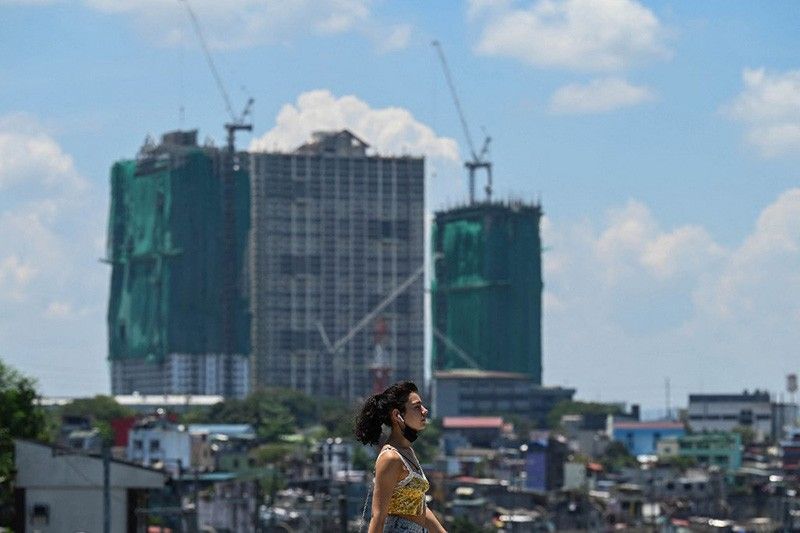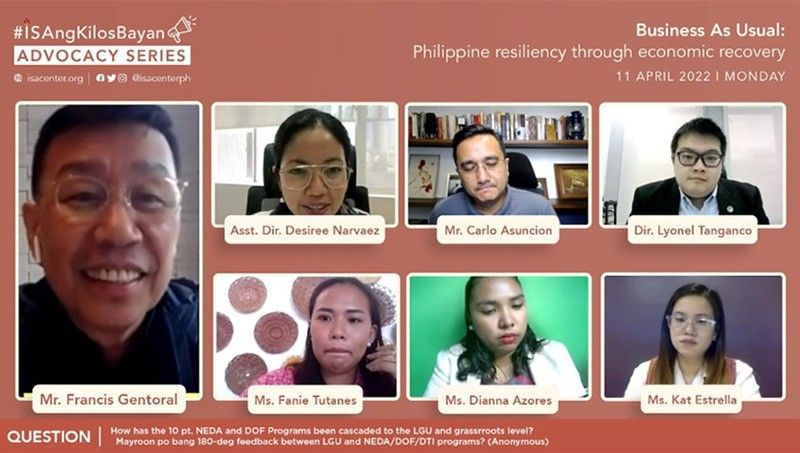MSMEs, gov't and private sector reps share lessons, including plans for economic recovery

MANILA, Philippines — Micro, small, and medium enterprises (MSMEs) are among the worst hit by the COVID-19 pandemic as it caused worker displacement and loss of livelihood.
As of November 2021, about 10% of small businesses were reportedly either permanently or temporarily closed. With the adverse effects on the MSME sector, the gradual ease in restrictions and shift to the "new normal" offer hope to the country's millions of small entrepreneurs.
The Institute for Solidarity in Asia (ISA) understood that a conversation on navigating uncertainties in any crisis was a crucial discourse to help move our nation forward. Last April 11, ISA conducted its first #ISAngKilosBayan webinar for the year, "Business As Usual: Philippine Resiliency through Economic Recovery," which convened notable government, private, and micro, small, and medium enterprises (MSME) sector representatives to tackle effective and sustainable Philippine economic recovery amid the COVID-19 pandemic.
Government and private sector representatives discussed the 10-point policy agenda, a proposal outlined by the Economic Development Cluster and National Economic and Development Authority (NEDA) to help the country accelerate its economic recovery from the pandemic through a whole-of-government approach of aligning programs with the national government. These representatives also engaged with local business owners to address their concerns as MSMEs. Together, they emphasized the importance of local entrepreneurs and other critical sectors in the country's overall economic recovery.
Moderated by Iloilo Economic Development Foundation Executive Director Francis Gentoral, the webinar featured panelists including NEDA National Policy and Planning Assistant Director Desiree Narvaez; Department of Finance Policy, Research, and Liaison Office Director III Lyonel Tanganco; and Union Bank of the Philippines Chief Economist Ruben Carlo Asuncion. Meanwhile, Hanap Habi Handloom Woven Products Founder Kat Estrella; PMTZ Care Marketing sole proprietor Teofanie Zamora Tutanes; and Delicioso Homemade Ham owner Dianna Azores represented the MSMEs.

The discussion raised several points, including the significance of an economic recovery plan such as the 10-point policy agenda, the need to embrace a digital transformation, and the crucial role of communication between the government and other sectors. Narvaez noted the 10-point policy agenda was a move in the right direction because having a playbook ready was one of the lessons they learned from the pandemic.
"Admittedly, there may be some gaps in the past, but that's something that we can learn from. So now we're moving forward and trying to implement changes and policies to correct and link the gaps," she said.
Tanganco said the policy agenda was a welcome development, especially since the government had a good fiscal position going into the pandemic, and that there is always the hope to learn to live with the circumstances and continue doing business.
From the private sector's perspective, Asuncion said that much like any other country, the government could never truly prepare for extreme situations like the pandemic, making consolidations like the policy agenda a practical and valuable approach. He added that this leaves the Philippines in a state of waiting and seeing what happens: "Wait and see means you're withholding something: your investment, your expansion. So it's very important that at least at this point, we have this."
The relevance of the policy agenda then shifted to its impact on MSMEs, the deemed backbone of the Philippine economy, and the need for mobility for businesses to continue. For Asuncion, such a need cemented the call for accelerated digital transformation, a pivotal point in the policy agenda. As there have already been private-sector efforts aiding MSMEs, particularly in digital mobility, he added it would be here to stay as the country moves towards the "new normal."
Tutanes observed that the current economic landscape seemed to communicate that digitization is the way to go to avoid business failure, prompting her to ask how the government was helping MSMEs make the change. Tanganco said that the Department of Trade and Industry could help with digitization through its Negosyo Centers and the SME Roving Academy programs. Narvaez added that the Technical Education and Skills Development Authority should also have free courses relevant to MSME digitization.
For Azores, external factors and her personal business situation made her consider online platforms and realize their benefits for her business. Asuncion said that while some businesses did not need to go online, they would miss an opportunity and still end up competing with digital counterparts. At this point, he advised that businesses carefully determine their niche: "Innovation, being agile, and listening to advice can ensure your success."
As the policy agenda affected their social enterprise, Estrella asked how the government would smoothly transition to a digital economy in a way that would reach even the grassroots sector and if there was an initiative on providing nationwide internet access. Narvaez said they set up an innovation staff to focus on their medium and long-term goals and pushed for several legislative agendas to facilitate the country's digitization process. She emphasized that if the Philippines did not go digital, the country would be left behind. In terms of internet provision, Narvaez added that they were working to provide it through strategically located Wi-Fi sites.
Based on the discussions, Gentoral said there was an apparent gap between the existing government programs and MSME needs, for which speakers agreed that it was crucial to establish communication among the relevant sectors. Narvaez recognized that the government should reach out to the MSMEs for them to become aware of the programs and that bureaucracy could be addressed through the full implementation of ease of doing business. On the part of the MSMEs, Azores suggested the government conduct a study to understand actual MSME needs and receive feedback on existing initiatives, resulting in a more concrete plan for MSMEs' economic recovery.
Ultimately, Gentoral reiterated the role of MSMEs in the Philippine economy and the significance of plans like the 10-point policy agenda to guide MSMEs and other critical sectors in navigating uncertainties and achieving resiliency.
"We want businesses to be sustainable, requiring good planning and a good government approach. As [Tutanes] has said, those who are saving, spending, and investing should work together to build the eco-system for resiliency of our local economy through MSME Development."
- Latest



























